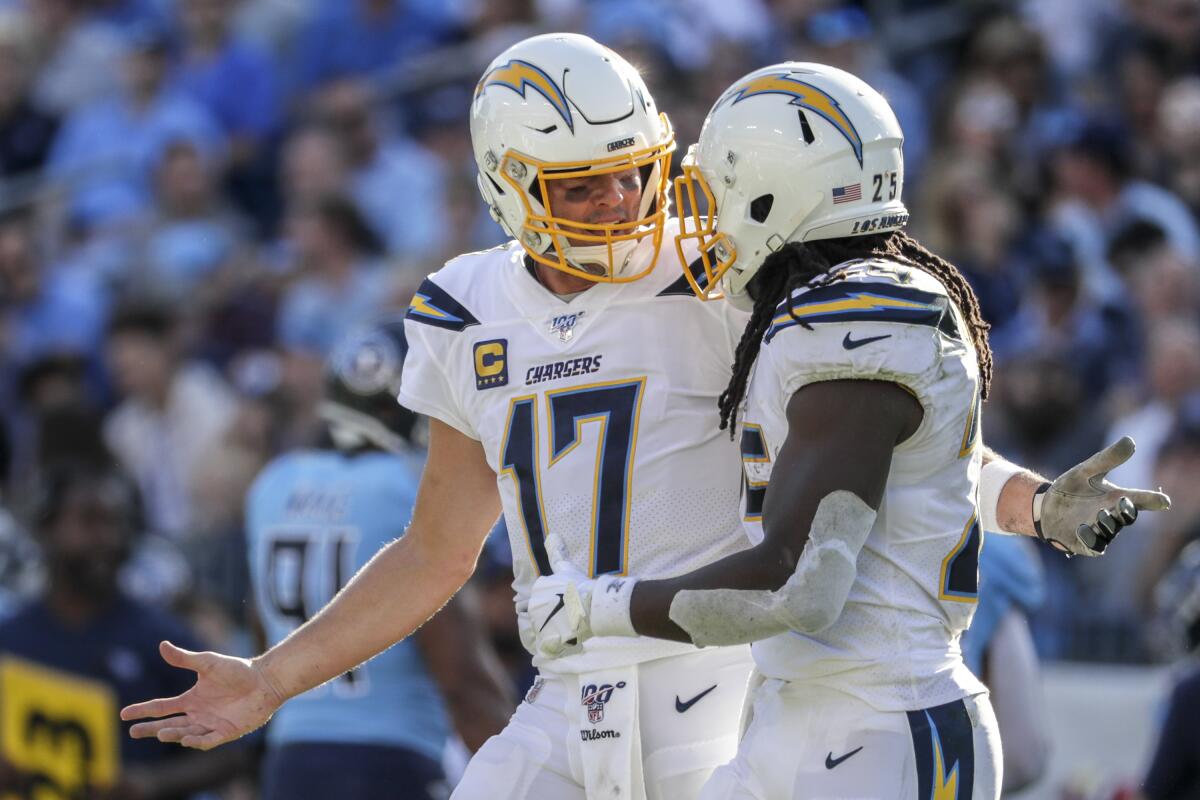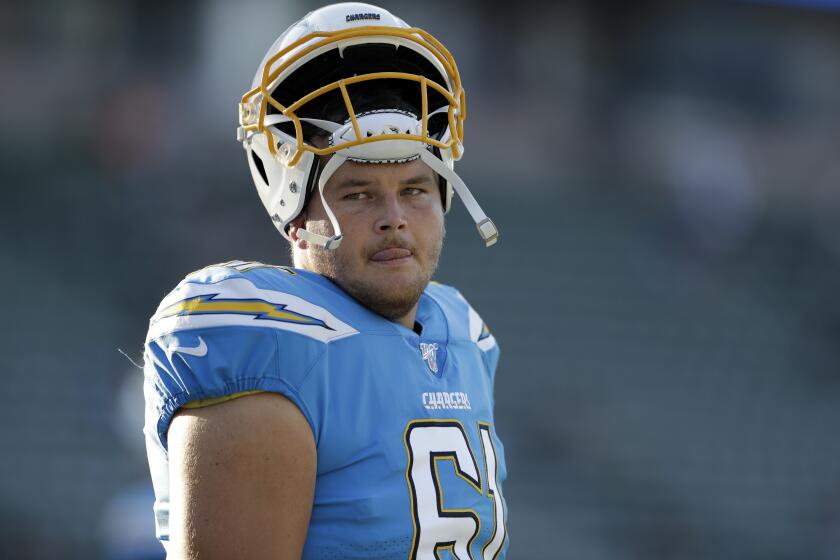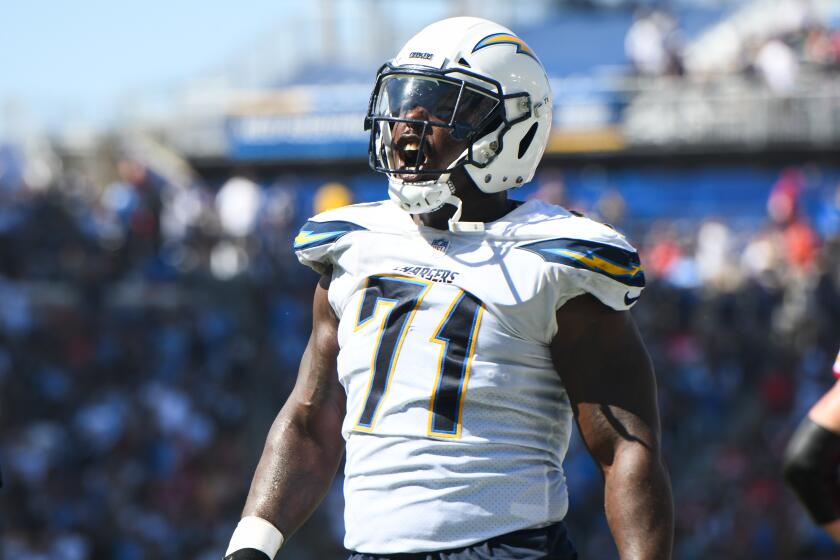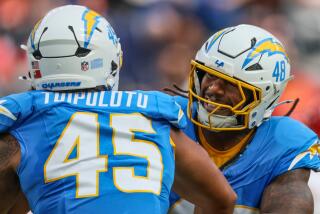Chargers have one goal against Bears: Make it to the end zone

- Share via
CHICAGO — There are 100 of them on every football field, the first 99 not a lingering concern for the Chargers.
But that last one?
“This one-yard stuff,” running back Austin Ekeler began, “it’s literally the story of our season right now. We’ve been this close.”
Football has become a game of inches for the Chargers, who seem to have developed an almost allergic aversion to crossing the goal line.
A week ago, they had the ball at the Tennessee one-yard line for three plays in the final 39 seconds and failed to score, Melvin Gordon fumbling away their last chance.
In Week 2, they had the ball at the Detroit one-yard line in the third quarter and Ekeler fumbled.
In Week 5, they had the ball at the Denver one-yard line in the second quarter and Ekeler’s desperate lunge for the pylon on the fourth down ended in another fumble.
“It doesn’t get any worse than that, as far as a feeling of guilt,” Ekeler said. “You feel like you let your team down. I know exactly how Mel felt” last week.
The Chargers are a wholly unexpected 2-5 entering their game Sunday against Chicago largely because they’ve turned the ball over five times in goal-to-go situations.
Chargers’ center Scott Quessenberry grew up a fan of his employer, and now gets to snap the ball to the quarterback he idolized as a kid, Philip Rivers.
Along with the three fumbles, Philip Rivers had passes intercepted twice — on second and goal from the Indianapolis seven, and third and goal from the Denver two.
No other NFL team has turned the ball over in such situations more than three times this season. Of the league’s 32 clubs, 26 have one giveaway or zero when presented with goal-to-go opportunities.
“We do know the consequences of those have been severe,” Rivers said. “It’s being conscious of it and then just going out and playing. You can’t let it cripple you from a playing standpoint.”
The Chargers also have had four touchdowns nullified by penalties, all those lost points crucial for a team that is 1-5 in games decided by one score.
How close, as Ekeler suggested, have the Chargers been in 2019? Their point differential is minus-1. The NFL’s other 2-5 teams, Denver and the New York Giants, are minus-24 and minus-55, respectively.
“You can take a positive that all the losses have been by one score,” coach Anthony Lynn said. “But it’s hard to, to be honest with you, when you sit here at 2-5. You feel like you’re a better football team than that.
“We gotta figure out a way to win some of these one-score games. We’ve done that in the past. We’ve got to get back to that. And that’s just blocking, tackling and taking care of the football.”
The Chargers built their encouraging 2018 season on their success in one-score games, going 7-1, including the playoffs.
Before losing their last five one-score games, they had won nine of their previous 10, dating to the end of the 2017 season.
Injuries have played a big role in the Chargers’ struggles this season, and the team’s defensive line is the latest position group to get hit hard.
It is worth repeating that, back at the start of training camp, Lynn and several of his players noted that momentum can’t be counted on to extend from one season to the next, a reality the Chargers are living today.
“I think we are close,” tight end Virgil Green said. “Every game, it’s just one or two things that aren’t being executed to ensure we come out with the win. It is frustrating, but that’s the NFL.”
Most of the lacking execution has come on offense, where, behind a patched-up offensive line, the Chargers have failed to exploit the weapons they felt so strongly about in the summer.
During their current three-game losing streak, they have generated only three plays that have gained 25 or more yards, compared to seven for their opponents.
One of the Chargers’ top weapons is 6-foot-4, 220-pound wide receiver Mike Williams, the No. 7 overall selection in the 2017 draft.
Of Williams’ 23 catches this season, just two have netted more than 20 yards. After scoring 10 touchdowns last season, he’s still looking for his first of 2019.
“We haven’t reached the halfway mark yet,” Williams said. “I feel like we’re still in it. We’re still capable of winning the rest of our games. I feel like everybody [should] forget about the games in the past right now.”
Unfortunately for the Chargers, even if those games can be forgotten, they aren’t going away. They are tattooed on a team that is beyond desperate for a victory.
Offensively, the Chargers remain in search of a running game and an answer for how to convert when the distance required can be reasonably expressed in inches.
During this losing streak, they’ve led once, for barely three minutes. They’ve scored four touchdowns in their last 32 possessions.
“I think it’s about scoring,” Rivers said. “Let’s score the football. That’s what we haven’t done. If that means running it better and more, then, heck yeah. Whatever it means, I think that needs to be our No. 1 objective.”
Etc.
The Chargers placed rookie safety Nasir Adderley on injured reserve Saturday to make room for left tackle Russell Okung. Adderley, a second-round pick out of Delaware, has been unable to stay healthy after initially injuring himself before the draft. Okung will make his 2019 debut against Chicago after missing the first seven games after the discovery of a pulmonary embolism in June.
More to Read
Go beyond the scoreboard
Get the latest on L.A.'s teams in the daily Sports Report newsletter.
You may occasionally receive promotional content from the Los Angeles Times.









